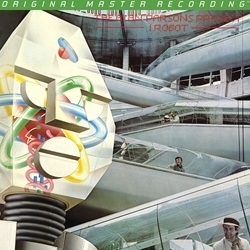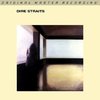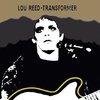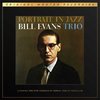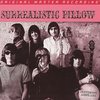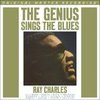The latest Mofi has the theoretic advantage of being spread on 4 sides at 45 rpm and with all the care that Krieg Wunderlich and Rob LoVerde must have put into this, it bears fruit : soundstage dimensionality; dynamic range; deep sub solidity; distortion-free instrument separation; midrange transparency; top end airiness; analogue ease; and a sense of unbounded ceiling height. a 9.8/10 for the latest 45 rpm MoFi. Tone Audio
The latest Mofi has the theoretic advantage of being spread on 4 sides at 45 rpm and with all the care that Krieg Wunderlich and Rob LoVerde must have put into this, it bears fruit by beating the Classic to a good degree in all the usual audiophile aspects: soundstage dimensionality; dynamic range; deep sub solidity; distortion-free instrument separation; midrange transparency; top end airiness; analogue ease; and a sense of unbounded ceiling height. 9.8 for the latest 45 rpm MoFi. -Sound
More Music, More Information, More Detail, More Nuance, More Everything: Mobile Fidelity 180g 45RPM 2LP Set the Definitive-Sounding Analog Version of 1977 Audiophile Standard
A Demonstration Disc for the Ages: Immaculate Highs and Lows, Supreme Spaciousness, See-Through Transparency, 3D Imaging, Wider Grooves on System-Testing Pressing
Audiophiles needn't any introduction to the Alan Parsons Project's I Robot. Engineered by Parsons after he performed the same duties on Pink Floyd's Dark Side of the Moon, the 1977 record reigns as a disc whose taut bass, crisp highs, clean production, and seemingly limitless dynamic range are matched only by the sensational prog-rock fare helmed by the keyboardist. Not surprisingly, it's been issued myriad times. Can it be improved? Relish Mobile Fidelity's stupendous-sounding 180g 45RPM 2LP set and the question becomes irrelevant.
Mastered from the original master tapes and pressed at RTI, and afforded the luxurious groove space of a 45RPM LP, I Robot comes to life like never before on this numbered limited-edition reissue. Boasting immaculate highs and lows, generous spaciousness, and see-through transparency that takes you into the studio with Parsons and creative partner Eric Woolfson at Abbey Road, this super-clean edition has been lovingly restored by Mobile Fidelity engineers with the intention of demonstrating the full-range capabilities of the world's best stereo systems. Put simply, there's more music, more information, more detail, more nuance, more everything.
Savor reference-grade soundstages, immersive smoothness, sought-after instrumental separation, three-dimensional imaging, and consummate tonal balances. Able to be played back at high volumes without compromise or fatigue, the analog masterwork is a demonstration record for the ages – the likes of which are no longer being made. Longtime fans can finally rest assured knowing they don't have to pony up hundreds of dollars for older pressings – including three prior Mobile Fidelity versions on LP and CD. This is the very reason you own and invest in high-end audio gear.
Inspired by and loosely based around the Isaac Asimov stories of the same name, I Robot delves into themes of artificial intelligence and technological dominance that make the record increasingly relevant in the 21st century. Indeed, Parsons' pinnacle creation dovetailed with the ascendency of Star Wars, which itself is experiencing a rebirth in an age of self-driving cars, smart devices, and mindless automation. Lyrically, songs such as "The Voice" call into question human behavior – and their relationship to increasing robotic supremacy – in everyday life. Sonically, Parsons reflects the associated paranoia, dichotomy, and transformation via shifting sci-fi arrangements steeped in drama and moodiness.
I Robot's absorbing tunes also continue to fascinate due to their perfectionism and innovation. Borrowing from Pink Floyd's strategies, Parsons utilizes a looped sequence on the title track to create new downbeats. "Some Other Time" employs two different lead vocalists and yet gives the illusion only one is involved. Captivating strings, a piccolo trumpet, and bona fide pipe organ grace "Don't Let It Show." The origins of "Nucleus" stem from a unique analog keyboard concoction dubbed "the Projectron," devised by Parsons and electronic engineer Keith Johnson. Andrew Powell's orchestral and choral arrangements top it all off, with "Total Eclipse" arriving as an aptly frightening track that presages the climactic "Genesis Ch. 1 V. 32."
Does man or machine win in the end? Decide with Parsons as you get lost in Mobile Fidelity's definitive pressing. Secure your lowest-numbered copy
Numbered, Limited Edition • 45rpm Speed Edition
• Mastering by Mobile Fidelity Sound Lab • Specially Plated and Pressed on 180 grams of High Definition Vinyl
• Special Static Free - Dust Free Inner Sleeve • Heavy Duty Protective Packaging
• Mastered from the Original Master Tapes • Pressed at RTI
Arranged By, Conductor – Andrew Powell
Backing Vocals – Hilary Western, John Perry Smokey Parsons, Stuart Calver, Tony Rivers
Bass, Guitar, Backing Vocals – David Paton
Chorus – The English Chorale, The New Philharmonia Chorus
Cimbalom, Kantele – John Leach
Drums, Percussion, Backing Vocals – Stuart Tosh
Executive-Producer, Keyboards, Synthesizer, Vocoder, Backing Vocals – Eric Woolfson
Guitar, Backing Vocals – Ian Bairnson
Guitar, Keyboards, Synthesizer, Vocoder, Backing Vocals – Alan Parsons
Keyboards – Duncan Mackay
Producer, Engineer – Alan Parsons
Steel Guitar – B. J. Cole
Vocals – Allan Clarke, Dave Townsend, Jack Harris, Jaki Whitren, Lenny Zakatek, Peter Straker, Steve Harley
Alan Parsons Project I Robot Track Listing:
1. I Robot
2. I Wouldn't Want to Be Like You
3. Some Other Time
4. Breakdown
5. Don't Let It Show
6. The Voice
7. Nucleus
8. Day After Day (The Show Must Go On)
9. Total Eclipse
10. Genesis Ch. 1 V. 32


GAIN 2 Ultra Analog™ is a proprietary cutting system built and designed by legendary design genius Tim De Paravicini, with consultation from one of MFSL’s founding fathers – Stan Ricker, an audio engineer responsible for many of MFSL’s most heralded past releases.
The GAIN 2 Ultra Analog™ system is comprised of a Studer™ tape machine with customized reproduction electronics* and handcrafted cutting amps that drive an Ortofon cutting head on a restored Neumann VMS-70 lathe. (*It is worth noting that independent studies have confirmed that the GAIN 2 Ultra Analog™ system can unveil sonic information all the way up to 122kHz!)
First and foremost, we only utilize first generation original master recordings as source material for our releases. We then play back master tapes at half speed enabling the GAIN 2 Ultra Analog™ system to fully extract the master’s sonic information. Our lacquers are then plated in a specialized process that protects transients in the musical signal. (Due to this process, there may be occasional pops or ticks inherent in initial play back, but as the disc is played more, a high quality stylus will actually polish the grooves and improve the sound). We further ensure optimum sound quality by strictly limiting the number of pressings printed for each release. These limited editions, in addition to being collectors’ items, ensure that the quality of the last pressing matches the quality of the first.
As you can imagine, all these efforts involve a tremendous amount of time, technology, cost and effort. The introduction of GAIN 2 Ultra Analog™ maintains Mobile Fidelity Sound Lab’s position as the world’s leading audiophile record label, where a passion for music with extraordinary sound quality matters most.
RTI HQ-180 Vinyl
Record Technology is a world class record pressing plant located in Camarillo, California. We have been operating since 1974, pressing for most audiophile record labels and for many quality minded independent and major record labels from around the world.
